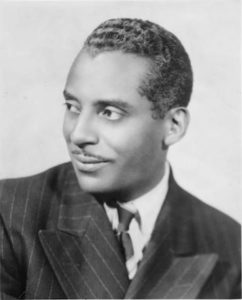
Noble Sissle
Noble Sissle, a Black musician and lyricist, was born on this date in 1889.
Born in Indianapolis, his early interest in music came from his father, a minister and an organist. His family moved to Cleveland when Noble was 17, and in 1908, before graduating from high school, he joined a male quartet for a four-week run of the Midwest vaudeville circuit. After graduating, he joined a gospel quartet for a tour on the same circuit. Riding the wave of new interest in Black entertainers brought on by the success of James Reese Europe, Sissle was asked to organize his orchestra, which he led at an Indianapolis Hotel. In 1915, he left the city for Baltimore.
Sissle and Eubie Blake became songwriting partners that same year after they met as members of Joe Porter's Serenaders. Their first song was "It's All Your Fault." They got some help writing it from their friend Eddie Nelson and showed it to Sophie Tucker. Tucker had arrangements made and used them the night after she heard it. "It's All Your Fault" made $200. For a while, Sissle and Blake performed separately. In 1916, Sissle worked with James Reese Europe at the Clef Club and soon led his group. The summer of that year, Blake rejoined him.
When World War I broke out in 1917, Sissle enlisted in Europe and helped recruit members for the military band he was forming. Blake, too old for military service, stayed stateside, composing songs they sent back.
When the armistice was signed, Europe and Sissle returned, and the three hoped to collaborate to revive African American theatrical shows on Broadway. It all came to an abrupt end when a band member killed Europe. After Europe's death, Sissle and Blake entered the white vaudeville circuit. There were very few Black performers because only one Black act was included in each show. Sissle and Blake, who billed themselves as "The Dixie Duo," were eventually highly successful. Patterned after their Clef Club presentations, their act was performed without blackface and with an on-stage piano as their only prop. Their many hit songs in vaudeville included "Gee, I'm Glad I'm From Dixie."
Sissle and Blake met the men with whom they were to make history at an NAACP benefit in Philadelphia in 1920. Flournoy E. Miller and Aubrey Lyles were veterans of Black show business who believed that the only way. Black performers would regain their dignity in white theaters through musical comedy. So, the four men pooled their resources and set about writing, directing, managing, and starring in their musical comedy. "Shuffle Along" was patterned after the Black shows presented during the first few years of the century, and when a casting call was issued, several performers from those early shows turned out. The partners found a backer, and after a shaky roadshow tour, "Shuffle Along" opened in New York on May 23, 1921.
Though many barriers to the free expression of Black creativity had been broken down by this time, a significant taboo remained: romantic love between black characters was never shown on stage. When the romantic song "Love Will Find A Way" premiered, Blake was on stage playing piano for the actors, but his partners were at the stage door, ready to flee if the theater erupted in violence. Instead, the song ended to great applause, and another wall came tumbling down. The most popular song to come out of the show was initially written as a waltz, but Lottie Gee, the young singer who was to perform it, complained that she couldn't sing it in waltz time, and the up-tempo "I'm Just Wild About Harry" became a hit.
The dancing in "Shuffle Along" impressed Florenz Ziegfeld and George White so much that they hired women from its cast to teach dance steps to the white women in their productions. Shuffle Along started a resurgence of Black shows. Following the show's successful run and subsequent successful road tours, however, the team that created it broke up. Soon after, Sissle and Blake wrote a dozen songs for a new white musical, "Elsie." The duo then made an early sound-on-film recording. In 1924, Sissle and Blake attempted another production, "In Banville," which was later renamed "The Chocolate Dandies." The show failed, however, because it did not fit the stereotype of "fast dancing and Negroid humor." In 1925, Sissle and Blake toured Europe. While abroad, they wrote songs for a British revue and began to have disagreements about the direction of their work: Blake wanted to return to America, and Sissle wished to stay in Europe.
Although they returned to the States, Sissle decided to return to Europe soon after, and the team broke up. In the 1930s, Sissle assembled a successful orchestra, and Blake worked with various Black songwriters, including Henry Creamer and Andy Razaf. He even wrote a song that was used for a Pabst Beer commercial. In 1933, Sissle, Blake, and Flournoy Miller reunited and attempted an unsuccessful revival of "Shuffle Along." Later in life, Sissle became involved in the Negro Actor's Guild, which he helped found, serving as its first president. In 1968, he and Blake recorded together on an album entitled 86 Years of Eubie Blake. Noble Sissle died on December 17, 1975.
A Pictorial History of Black Americans
by Langston Hughes, Milton Meltzer & L. Eric Lincoln
Copyright 1956, Crown Publishers, N.Y.
ISBN 0-517-55072-5